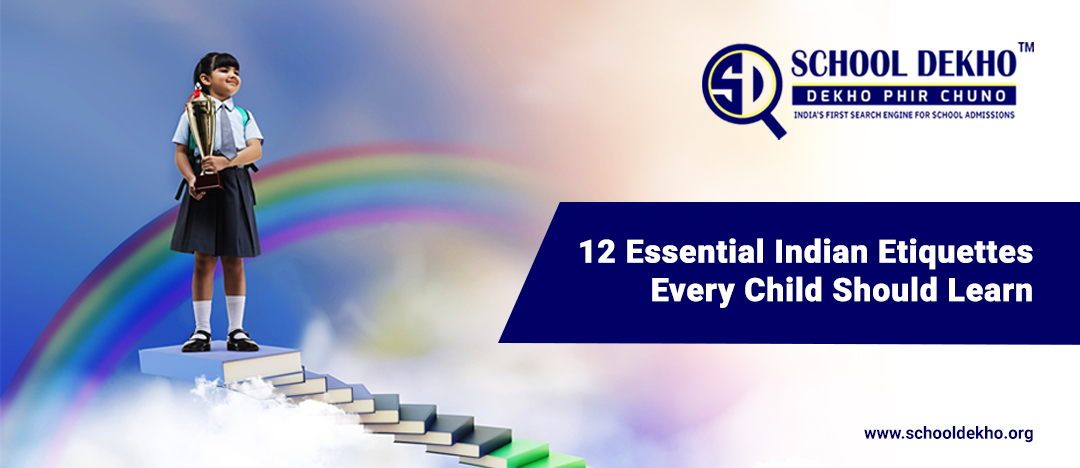12 Essential Indian Etiquettes Every Child Should Learn

Etiquette plays a vital role in shaping a child's character and helping them navigate social situations with grace and respect. In India, a rich tapestry of culture and traditions permeates everyday life, making it important for children to learn and practice Indian etiquette. This article highlights 12 essential Indian etiquettes that every child should learn to cultivate respect, social skills, and appreciation for diversity.
Respect for Elders:
Teaching children to respect and honor elders is a fundamental aspect of Indian culture. They should be taught to greet elders with folded hands and address them with respectful terms such as "uncle" or "aunty" (in English) and "dada" or "didi" (in Hindi).
Gratitude:
Instilling a sense of gratitude in children is crucial. They should be taught to express thanks and show appreciation for gestures of kindness and assistance, fostering a culture of gratitude.
Titles and Greetings:
Children should learn the appropriate titles and greetings for different relationships. Addressing teachers as "sir" or "ma'am," greeting friends with "namaste" or "hello," and using honorifics like "ji" (e.g., uncleji, auntiji) reflect polite and respectful communication.
Personal Hygiene:
Emphasize the importance of personal hygiene to children, including regular bathing, washing hands before meals, and brushing teeth. These habits promote cleanliness and good health.
Dining Etiquette:
Teach children table manners such as using cutlery properly, not talking with food in their mouths, and waiting for others to begin eating before starting their meal. Encourage them to eat with their right hand when traditional Indian cuisine is served.
Respect for Diversity:
India is known for its cultural diversity. Teach children to respect different languages, religions, and traditions. Encourage them to embrace diversity, appreciate different perspectives, and treat everyone with kindness and acceptance.
Festival Etiquette:
India celebrates numerous festivals with great enthusiasm. Children should learn the appropriate behavior during festivals, such as wearing traditional attire, participating in rituals with reverence, and being mindful of noise levels during religious ceremonies.
Polite Communication:
Teach children to communicate politely, using phrases like "please" and "thank you." Encourage them to listen attentively when others speak and to express their thoughts and opinions respectfully.
Sharing and Empathy:
Instill in children the values of sharing and empathy. Encourage them to share toys, help others in need, and show compassion towards fellow students, friends, and family members.
Environmental Consciousness:
Promote environmental consciousness by teaching children to conserve resources, recycle, and keep public spaces clean. Encourage them to appreciate nature's beauty and take responsibility for preserving it.
Dress Code:
Children should understand appropriate dressing for different occasions. Teach them to dress modestly for religious places and formal events, and to adhere to school dress codes.
Public Behavior:
Inculcate good behavior in public spaces. Teach children to be mindful of noise levels, respect queues, and offer seats to those in need, such as the elderly or pregnant women.
Learning and practicing Indian etiquette is essential for children to develop strong social skills, respect for others, and an understanding of their cultural heritage. By teaching them these 12 essential etiquettes, parents and educators can help children navigate social situations with grace, promote values of respect and gratitude, and foster a harmonious and inclusive environment. These etiquettes not only shape their character but also contribute to building a cohesive society where individuals from diverse backgrounds can coexist harmoniously.
By instilling these Indian etiquettes in children from a young age, parents and educators lay the foundation for their social and personal development. These etiquettes help children understand the importance of respecting elders, expressing gratitude, and communicating politely. They learn to appreciate the diversity that India offers and develop empathy and compassion towards others.
Learning personal hygiene habits and dining etiquette teaches children the importance of cleanliness, health, and proper behavior during meals. By following these practices, children become more aware of their own well-being and show respect for others while dining together.
Festivals hold a significant place in Indian culture, and teaching festival etiquette helps children appreciate the cultural heritage and traditions associated with different festivals. They learn to participate in rituals with reverence and celebrate festivals with joy and respect for their significance.
The value of sharing, empathy, and environmental consciousness is essential for nurturing compassionate and responsible individuals. By encouraging children to share, empathize, and care for the environment, they become more considerate of others and develop a sense of responsibility towards the world they live in.
Moreover, understanding dress codes and public behavior enables children to adapt to various social settings and respect the norms and expectations of different environments. They learn to present themselves appropriately and behave responsibly in public spaces, contributing to a positive and respectful societal atmosphere.
In conclusion, teaching children these 12 essential Indian etiquettes cultivates respect, social skills, and an appreciation for diversity. By incorporating these etiquettes into their daily lives, children not only become well-rounded individuals but also contribute positively to their communities. It is through practicing these etiquettes that children learn to navigate social situations, demonstrate respect for others, and embrace the cultural richness of their Indian heritage.
Contact with Us
Call: 1800 - 2588 - 074
Mail: info@schooldekho.org
Student’s Best Education Portal | School Dekho | India's First School Search Engine | Best Schools Near Me | Find Schools Near me | Dekho Phir Chuno
#dekhophirchuno






